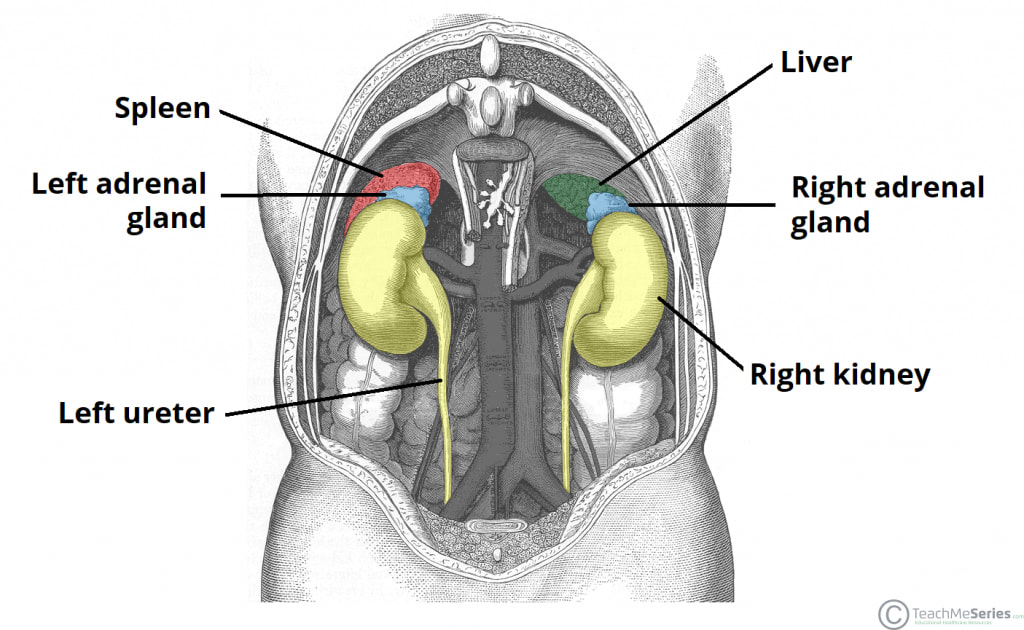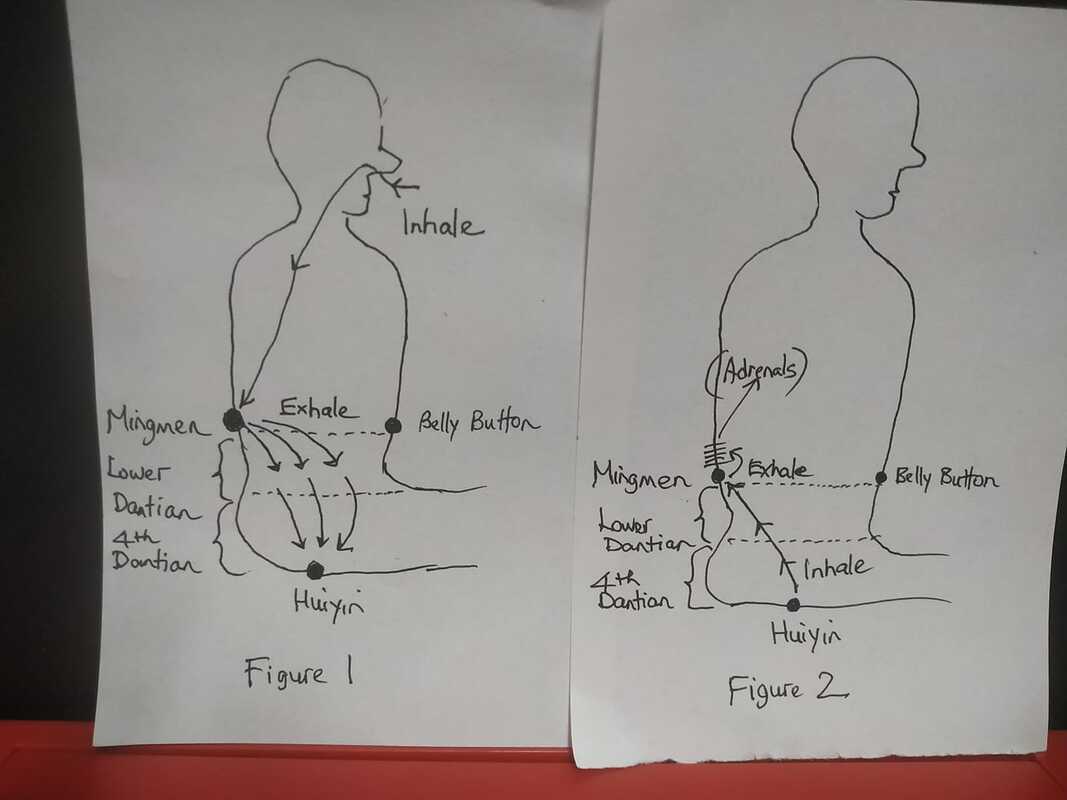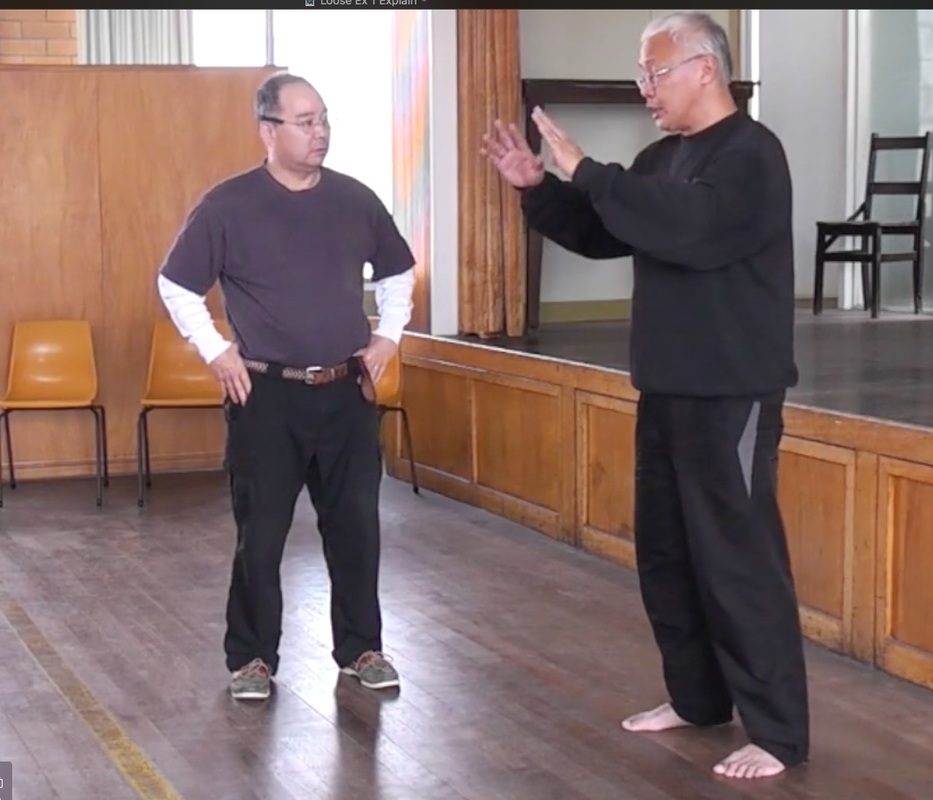 Image from the TeachMeSeries.
Image from the TeachMeSeries. Qigong and Taiji can help maintain the healthy function of your adrenal glands and reduce the chances of ageing-related degenerative diseases and adrenal fatigue.
Proper adrenal function (the adrenal glands which sit on top of our kidneys - see pic above) is important for the production of many of our critical hormones, which are in turn, are released at different points in our daily cycle. In particular our adrenal glands produce cortisol which is at its highest production in the morning. This is responsible for our "get up & go" and ability to deal with stress. The adrenal glands also produce melatonin which is the sleep hormone produced at night, and DHEA (dehydroepiandrosterone) which counteracts the negative effects of excessive cortisol.
Cortisol and inflammation
In addition to giving us our "get up and go" cortisol is the most important anti-inflammatory hormone we produce in our bodies. Why is it important to keep inflammation in control? Because long-term, chronic inflammation is at the root of premature ageing and ageing-related degenerative diseases such as diabetes, stroke , heart attack etc. If we suffer from adrenal fatigue we lack sufficient cortisol to deal with the stresses and demands of daily life and are less able to control the destructive effects of chronic inflammation. Hence, not only do we feel overwhelmed, anxious by the demands of life and rely more on stimulants, but we age faster and are more at risk of developing the usual ageing-related disease previously mentioned (Nicolle & Bailey, 2014).
https://www.relaxedmindtaichi.com/-blog/free-stress-busting-tai-chi-exercise
Negative effects of excessive cortisol
However if the adrenal glands produce excessive cortisol, that is not good either, too much cortisol interferes with the body's ability to repair itself. This is where DHEA plays its part by counteracting the negative effects of excessive cortisol. So a healthy, functioning set of balanced, self-regulating adrenal glands is vitally important to our health and wellbeing (Nicolle & Bailey, 2014).
Stress & the adrenal glands
The causes of this imbalance in adrenal function are many and include the list of the usual suspects - toxins, drugs, alcohol, non-nutritious foods, unhealthy lifestyle, poor gut health, poor eating habits, etc. Unsurprisingly Nicolle and Bailey cite that stress - mental, emotional, psychological. “.... is at the centre of adrenal problems and often of thyroid disruption as well.” (p125: Nicolle & Bailey)
https://www.relaxedmindtaichi.com/-blog/boosting-your-vitality-zhan-zhuang-standing-exercise
Taiji and Qigong to reduce stress
By practicing these internal soft healing arts as Taiji and Qigong we can address what is within our sphere of influence. Just focussing on reducing and managing stress - by practicing Taiji we have a very effective, accessible and practical tool where we can deal directly with this insidious killer. The repetitive, slow, calming, mindful sequence of movements, the light awareness of listening to your body, aligning of posture, the constant directing of the mind to various markers, the synchronised movements of the base, body, arms, hands, eyes and mind, the rooting with the ground and the constant reminder to relax and sink; never fails to dissipate any stressful episodes that I've experienced.
For those interested in discovering the mindful, stress-reducing/health promoting exercise of this Yang Style Taiji, join my online Relaxed Mind Tai Chi Beginners Lessons (part 1) CLICK LINK BELOW -
https://www.relaxedmindtaichi.com/store/c6/Relaxed-Mind-Tai-Chi-Beginners-Lessons
Qigong Meditation for the adrenals and kidneys
Qigong healer and expert practitioner Kwai Chee Low describes a meditation exercise that is beneficial for our adrenal glands and kidneys. This exercise is slightly different from the previous meditation exercise from KCL previously posted -
"Scientists tell us that we're only using 3% of our brain. Meditation helps us to use more of it to strengthen our internal organs and their functions and thus bringing vitality to our health.
Our Kidneys and adrenals are an important aspect of good health. When these deteriorate due to poor lifestyle and diet many ailments surface. The worst is where there is a need for dialysis.
Practising Qigong consistently on a daily basis will help significantly to ensure the health of the Kidneys and adrenals. Meditation on the Mingmen especially targets these important organs. I have earlier posted methods on Meditation of the Mingmen Part 1 & Part 2.
Here I'm sharing Meditation on the Mingmen Part 3. Part 3 is independent on its own and you can practise it even without referring to Part 1 or 2. Part 3 is significantly more effective but you must be perfectly relaxed while doing it.
Requirements:
i. Able to look inwards
ii. Able to do slow and deep inhalation and exhalation
iii. Able to lead the qi while inhaling or while exhaling
iv. Able to feel the qi during the process
Note:
i. The Mingmen is directly opposite the belly button
ii. In either side of the Mingmen are the Kidneys
iii. The adrenal glands rest on top of each Kidney. These glands produce hormones that help regulate metabolism, immune system, blood pressure and response to stress
iv. The lower dantian is split into two, with the lower "compartment" termed as the 4th dantian. This is to facilitate the flow of qi
Method
i. Relax completely in your favourite sitting posture. Your palms facing upwards on your thighs. You can use your favourite fingers posture. I prefer the Apana mudra posture for the fingers. Remember this mudra is contraindicated for pregnant women
ii. Look inwards and have a clear image of your Mingmen, Kidneys and adrenal glands
iii. When you're ready, slowly inhale and visualise and FEEL the qi entering your nostrils and down to your Mingmen. Feel the qi filling up the Mingmen and Kidneys.
iv. Slowly exhale and sink the qi like a mist to fill up the lower dantian then go down further to fill up the 4th dantian "compartment" and reach the Huiyin.
See Figure 1 (below)
v. Now refer to Figure 2 (below).
vi. Slowly inhale and send the energy from Huiyin up to the Mingmen and feel the energy filling up the Mingmen.
vii. Slowly exhale and sink the energy from Mingmen to fill up the Kidneys and then the adrenal glands.
Repeat the whole process. You can practise this for 10/20/30 mins or even up to an hour, it's up to you.
Remember to do a closing at the end of the session.
When practised correctly, you should feel warmth at the Mingmen, Kidneys, adrenal glands, Huiyin and the lower dantians."
Kwai Chee Low
I would also add a minor point - to keep the tip of your tongue lightly attached to your upper palate if you're not already doing so.
Authour - Lee Chang Tye
www.relaxedmindtaichi.com
copyright- Relaxed Mind Tai Chi
References
Lorraine Nicolle and Christine Bailey (2014), "Eat to get younger: tackling inflammation and other ageing processes for a longer , healthier life" : Singing Dragon, London and Philadelphia.


 RSS Feed
RSS Feed